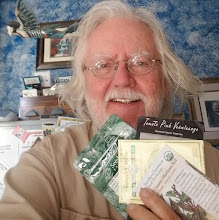Rain on a broccoli, and the photographer and his camera.
We are grateful for the rain - even this so-called 'negligible precipitation.' This year, 2010, is shaping up to be our fourth year of drought.
We are grateful for the rain - even this so-called 'negligible precipitation.' This year, 2010, is shaping up to be our fourth year of drought.
One of the wonderful things of living in Southern California, this close to the Pacific Ocean is the wonderful mild weather we enjoy. This is both a blessing and a curse. Further inland and on almost all of the North American continent, 'gardening' this time of year means looking in the seed catalogs that have begun to fill your mailbox. If you aren't getting seed catalogs on a regular basis, you haven't been gardening a long time.
One of the truisms I will emphasize will be to garden with passion. For me, gardening means doing it yourself and learning what works and how it works. This time in my garden is exciting. On days it isn't raining, the cool weather makes some of the more strenuous work a little less onerous. So this is the time to think about a general garden cleanup, if you haven't done it already.
It is also still a time to look after perennial food. Right now, I begin to contemplate pruning my fruit trees. I will contemplate this for as long as I can procrastinate actually doing it! If you have no experience at it, do your trees a favor and order a pruning handbook from University of California’s Agricultural and Natural Resources Division (ANR) or purchase a pruning book from a reputable source. Remember that these trees will live a lot longer than a typical pet and we wouldn't treat our cats or dogs with the indifference many people show towards trees. Pruned correctly, an apple, plum or peach will produce luscious tasty fruit for many years. It's actually harder on you (and the tree) to prune incorrectly, so find out how and do it as right as you can in the first place.
This is still the dormant season to purchase deciduous fruit trees, apples, apricots, grapes and ornamentals such as roses and wisteria, to name a couple of my favorites. If you are putting perennial herbs in the ground (sage, rosemary and thyme – parsley is a biennial, with apologies to Paul Simon), this is the best time to put them in the ground – even though you may plant them here year round. Buy your trees or vines from someone who knows where you live in order to insure you are getting plants that will produce for you. A local neighborhood nursery will only carry plants that will do well in your climate whereas a big box store will carry things that are more likely to grow over a much wider area. You'll also find the selection at most big box stores to be woefully short and the staff indifferent at best to your needs.
Mail order suppliers are excellent venues for purchasing trees. One of my best finds was from a mail order nursery. I called and talked to one of the staff asking a few questions. There is no replacement for a person with knowledge. Based on where I was gardening, he suggested I grow Dorsett Golden apples. I took his suggestion and I have been blessed with year after year of a delicious, sweet and crisp apple that has wowed visitors to my garden ever since.
When I prune the deciduous stone fruit trees (including peaches, apricots, plums and apples,) if I have had problems with insects in the trees, I finish the job by spraying the trees with dormant oil. Of all the pesticides, this pesticide, with it’s low toxicity to mammals and its 100% effectiveness on pests is one of the best that is listed for organic gardens. If insect infestations are of concern to you, this is the best time to spray because the tree is dormant, not actually growing. A dormant oil spray can be a valuable addition to controlling many pests in these kinds of trees. However, take precautions if you feel you must spray. Follow the directions of the package very closely – using pesticides in ways not described on the label is against the law and usually defies common sense.
While pesticide labels will allow you to spray in the morning or in the evening, please only spray in the evening. Do NOT spry ANY pesticide in the morning ever. Spraying in the morning can allow the pesticide to kill off honey bees which we do not want – while spraying in the evening will insure the bees have returned to their hive for the night. Organic pesticides are only effective when they are wet and are dry by the morning. Honey bees, which have been having a hard time of it lately, should be one of any gardeners' biggest concerns. Please only spray any insecticide in the evening.
However, if you don't have pests to begin with, please consider not spraying at all. We are counting on our trees for food, so we will want to be proactive in their care, but we also need to be intelligent in our use of killing agents in our environment. Much of the problems we face in our world today are the result of mankind's irreverent use of “-icides” of all types. Somehow, modern man has become convinced that warring with nature is a fight he can win. I believe we are foolish when we spray just because. If you have pests, deal with them as the year goes along – and deal with them in ways that avoids all sprays, all “-icides.” I think we can be a lot more intelligent in our dealings with the critters that compete for our food supply and spraying is just admitting we are too stupid to deal with something in a more positive fashion. This does not mean I NEVER spray. But when I do spray, I do think I've just not figured out a less destructive way to solve the problem. Better people than I have called me stupid so, yes, sometimes I do think I might have done better.
On the other hand, all of your citrus fruit trees are evergreen, so they can technically be pruned at any time of the year, but they are best pruned when there is nothing better to do and the day is not too warm, so the person doing the work doesn’t overheat. You cannot spray citrus with dormant oil sprays because they are never dormant. (Something that is 'evergreen' doesn't go dormant – basically 'evergreen' means, no dormancy.) A recent innovation has been the formulation of lighter oil sprays that are called 'summer oils.' They do the same thing as dormant oils with a much less heavy hand and so can be sprayed when the days are warmer and on trees with living leaves. They work well, perhaps not quite as well as dormant sprays, but they are pretty effective. Their drop in effectiveness might be that they are used on trees with leaves and therefore the spray doesn't reach all the insects rather than any lack of killing power on the part of the spray; I don't know if research has been done to show it one way or the other.
As above, though, if you don't HAVE to spray, please don't. A healthy garden is shared among many critters – insects, birds, fungi, bacteria, mammals and humans. By introducing poison to your garden, you run the risk of killing off more than just your target species. Try to find an intelligent way to solve your problems. Read up on the pest. Find it's enemies and make friends with them. Your garden will be healthier and so will you.
This may be a cold month and, if we are blessed, rainy. But we still have to keep our eyes out for Santa Ana winds – sometimes hot and sometimes cool, but always dry and desiccating to garden plants, and plants in pots suffer all the more. If your skin is crawling and you need more skin cream, or lip goop, you can bet your plants need more moisture too! It’s best to get out there with a hose and help your irrigation system keep up – you’ll enjoy your garden more – the “best fertilizer is the farmer’s shadow.” Still.
Are you ready to think about summer yet? You mean you never stopped thinking about summer? Now is the time the new seed catalogs come rolling in by the truckload and they all have wonderful photos and several hundred new mouth-watering, irresistible new varieties that I must try… all in a 10’ square bed. If you aren’t getting these free catalogs, a quick jaunt through any gardening magazine will net you half a dozen 800 numbers or you can get web addresses from which to order. Once you've ordered from one, next January will be a real treat. I get sometimes three or four a day.
What will it be this year? Eight different sweet peas, half a dozen different lettuce plants? Look at all those tomatoes for sale and how about the dozen different violas from Thompson and Morgan? And if I knock down the neighbor’s garage, I think I could grow some squash and pumpkins….
More in a minute or two...
david










.jpg)
2 comments:
Indeed we are lucky to urban farm in S. CA. My raised beds runneth over. I have a home garden, 2-4'X8' raised beds and couple more beds in a community garden. I don't have time to look at the seed catalogs!
Hey I just 'fanned' you on FaceBook! Hope you can become a fan of The Learning Garden. Thanks to the rain, I've been going NUTS in the seed catalogs! Territorial Seed, Peaceful Valley Farm Supply and Pinetree Seeds. Lord. If the rain doesn't break soon, I'm going to spend all I got! Look for a January update before the sun shines! david
Post a Comment